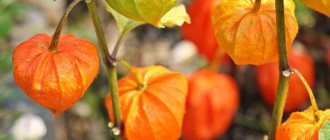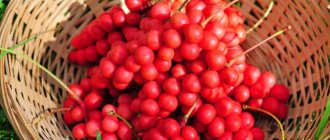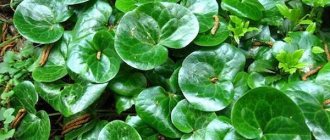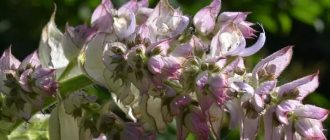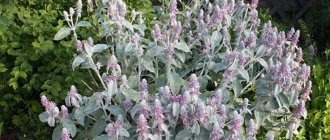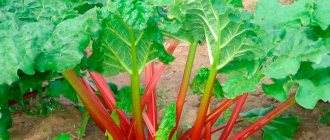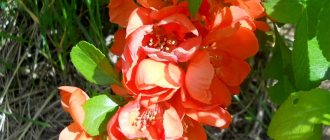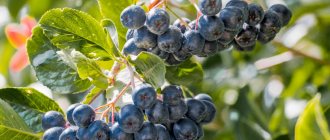The herbaceous plant Jerusalem artichoke (Helianthus tuberosus), also called tuberous sunflower, is considered a representative of the Sunflower genus of the Asteraceae family. This plant is also popularly called Jerusalem artichoke, bulba, earthen pear or barabola. “Jerusalem artichoke” comes from the name of the Tupinamoas Indian tribe, which lived in what is now modern Brazil. This plant was brought to European countries through France and England in the 16th century, and it began to be widely grown as a food and fodder crop in the mid-19th century. Under natural conditions, such a culture can be found in North America in wastelands and along roads. Jerusalem artichoke is cultivated in almost all countries, while in some of them (for example, in Switzerland, Japan and Australia) it is considered a weed, since it is frost-resistant, unpretentious, productive, and this plant is also able to quickly adapt to any conditions .
Jerusalem artichoke - a source of multivitamins
The plant is multivitamin.
Although green mass is richer in vitamins than tubers, the latter are superior to potatoes in their content.
The use of Jerusalem artichoke powder as a food additive stimulates the synthesis of vitamins and activates immune defense mechanisms .
A person's daily need for vitamins is only a few milligrams or micrograms.
Unlike inorganic substances, vitamins are destroyed by strong heat.
Many vitamins are unstable and are “lost” during cooking or food processing.
The technology for producing Jerusalem artichoke powder allows us to preserve the entire range of beneficial properties of this vegetable and bring it to the consumer.
Features of the plant
Jerusalem artichoke is a storehouse of vitamins, and in the spring it can be dug up and used as a healing remedy against vitamin deficiency.
- This is an unpretentious crop and can produce a harvest in any soil;
- Tubers are not afraid of weeds and pests;
- Grows well both in the shade and in the sun;
- Almost does not accumulate nitrates;
- The calorie content of the crop is equal to potatoes.
Fructooligosaccharides and inulin in Jerusalem artichoke
Jerusalem artichoke is distinguished from other vegetables by a unique carbohydrate complex based on fructose and its polymers: fructooligosaccharides and inulin.
Fructooligosaccharides are a mixture of short chains of glucose and fructose.
Fructooligosaccharides are utilized by most strains of bifidobacteria, as well as some cultures of lactobacilli.
When fructooligosaccharides are consumed in the intestine, the microbial status is normalized with an increase in the absorption of calcium and magnesium ions from the intestine.
Fructooligosaccharides are low in calories and are therefore recommended for people suffering from diabetes and obesity .
Fructose is an essential component of Jerusalem artichoke.
Its content may vary depending on the time of collection, harvest, duration of storage and other factors.
It is formed from inulin as a result of biochemical processes occurring in roots and tubers.
Fructose is a dietary sugar that is able to participate in the same metabolic processes as glucose, replacing it in cases of relative or absolute lack of insulin.
Short fructose chains absorbed in the intestines and in the blood continue to perform an antitoxic, cleansing function, binding, neutralizing and facilitating the removal from the body of harmful metabolic products and chemical compounds from the external environment .
Inulin is a good remedy for intestinal dysbiosis of various origins, since it promotes the proliferation of “friendly” bacteria in the digestive tract and in the intestinal contents.
At the same time, there was an increase in the absorption of various mineral salts, especially calcium, a decrease in the level of cholesterol in the blood serum, a decrease in the content of carcinogens and putrefactive substances. (Shenderov B.A., 2001).
One of the main medicinal properties of Jerusalem artichoke is the highest concentration of a rare natural biologically active substance - inulin.
Inulin is the only natural polysaccharide consisting of 95% fructose.
Inulin is not absorbed in the stomach; part of it, in the acidic environment of gastric juice, breaks down into short fructose chains and individual fructose molecules that penetrate the bloodstream.
Inulin has a beneficial effect throughout the entire time it is in the human body - from entering the stomach to excretion.
Firstly , inulin functions as an extremely active sorbent, capable of binding and removing from the body a large amount of toxic and ballast substances ingested with food or formed in the intestines during digestion.
Secondly , it significantly stimulates the motor activity of the gastrointestinal tract (motility and peristalsis).
Inulin, entering the gastrointestinal tract, is broken down by hydrochloric acid and enzymes into individual fructose molecules and short fructose chains, which penetrate the bloodstream.
The remaining undigested part of the inulin is quickly eliminated, binding a large number of substances unnecessary to the body, such as heavy metals, radionuclides, cholesterol crystals, fatty acids, various toxic chemical compounds that enter the body with food or formed during the life of pathogenic microbes living in the intestines .
Thirdly , inulin and short fructose chains (inulin fragments) have a pronounced choleretic effect, which is enhanced due to the facilitation of the outflow of bile from the liver and gallbladder into the duodenum, due to improved bowel movements.
Inulin, passing through the gastrointestinal tract, binds cholesterol crystals, dense lipoproteins, and reduces the level of hyroglycemia.
This substance - inulin - promotes the utilization of glucose in the human body.
The chemical composition of the plant includes the natural polymer of fructose, which consists of inulin and a complex of fructans, which are absorbed by the body without the participation of insulin. Fructose is a unique sugar that is able to participate in the same metabolic processes as glucose and fully replace it in situations where glucose is not absorbed by cells. Therefore, patients with diabetes can include Jerusalem artichoke in their daily diet and at the same time refuse other sugar-lowering drugs or significantly reduce their dose.
↑ Diseases
The most dangerous disease of earthen pear is white rot, or sclerotinia. It affects both the above-ground part and the tubers. Initially, brown spots appear on the lower part of the stem, which gradually cover the entire stem, and then the inflorescence. The above-ground part dries out, and the roots and tubers rot.
The source of infection is diseased tubers, stems, leaves, and soil on which diseased plants grew.
The earthen pear cannot be planted on lands that were occupied by sunflowers, carrots, turnips, beets, infected with white rot, or returned to the old place before 4-5 years. Only healthy tubers should be selected for planting.
On acidic soils, sclerotinia develops especially strongly. Therefore, liming not only increases productivity, but is also a measure to combat white rot.
Organic polyacids
Organic polyacids - 6 - 8% of dry weight.
These include: citric, malic, malic, succinic, fumaric acids.
Organic acids:
- actively participate in metabolism
- increase the secretory activity of the salivary glands
- increase the secretion of bile and pancreatic juice
- improve digestion
- dissolve unwanted deposits (uric acid salts)
- have a bactericidal effect
- have a beneficial effect on acid-base balance
- on the function of the gastrointestinal tract and other body systems, being causative agents of pancreatic secretion and intestinal motor function.
Organic acids affect the digestive processes, facilitating the absorption of foods that contain very little acid.
When combined with vitamin C, they have a pronounced antioxidant effect.
Jerusalem artichoke is rich in pectin substances
Pectins are high-molecular carbohydrates that make up the cell membrane and intercellular substance.
Pectins have absorbent, astringent and gelling properties.
Pectin substances are polysaccharides present in Jerusalem artichoke in an amount of 11% by weight of dry matter.
Pectin was discovered more than 200 years ago and was first obtained from the Jerusalem artichoke root crop.
Pectins adsorb on their surface and remove toxic substances from the body, cholesterol, triglycerides, which are the main culprits in the development of atherosclerosis and gallstone disease.
They help improve metabolic processes, normalize intestinal motility, and improve peripheral circulation.
But the most valuable property of pectin is its ability to cleanse living organisms without leaving behind any “garbage” and without disturbing the balance of the body’s internal environment.
Scientific research suggests that pectins may reduce the accumulation of atherosclerotic plaques on the walls of the heart arteries .
The complexing property (the ability to form complexes with heavy metal ions) allows the use of pectins as a prophylactic agent in conditions of professional contact with heavy metal compounds, pesticides, and radioactive substances.
Cellulose
The human body does not absorb all the food eaten; a certain part of it is not digested, but is simply excreted from the body.
For a long time, scientists were convinced that fiber was not needed by the body and was even harmful.
Back in the middle of the 20th century, nutritionists assured that refined foods were the healthiest, and the world enjoyed purified, refined food until an alarming fact became noticeable: the more refined food a person consumed, the more gastritis, colitis, pancreatitis, cholecystitis, malignant tumors.
According to Bengmark S. (1998), low fiber content in food is an important etiological factor in the development of colon cancer, diverticulosis, constipation, obesity, and vascular thrombosis.
Today, fiber has finally taken its rightful place next to proteins, fats, carbohydrates, microelements and vitamins.
It is now clear that fiber is healing and necessary for the body.
It acts like a good broom: “cleaning” the thinnest villi that line the inner surface of the intestines, preventing them from sticking together.
Fiber absorbs large amounts of liquid, facilitates bowel movements, and relieves colitis, gastritis and constipation.
The swollen fiber, moving through the intestines, removes from it harmful chemicals, mutagens, carcinogens, which provoke the development of malignant tumors.
It also helps reduce blood sugar and cholesterol levels.
Foods low in fiber provide less satiety, which may be why people began to overeat.
And again the risk of obesity, hypertension, and diabetes increased.
Despite the fact that fiber is found in sufficient quantities in whole grains and fruits, they contain a lot of carbohydrates, so it is better to prefer fiber using Jerusalem artichoke powder.
Protein
Jerusalem artichoke tubers are rich in protein - 3.2% on a dry matter basis.
Analysis of the amino acid composition shows that Jerusalem artichoke protein is sufficient in leucine, threonine, tryptophan, phenylalanine and tyrosine, but limited in lysine, which is typical for most plant proteins.
Jerusalem artichoke protein contains many amino acids (16), including 10 essential ones (they are not produced by the human body, but come only from food): arginine, valine, histidine, isoleucine, leucine, lysine, methionine, threonine, tryptophan, phenylalanine.
Chemical composition
Jerusalem artichoke tubers consist of 20% dry substances, of which 80% is the polymeric homolog of fructose - inulin, 11% - pectin substances.
Table No. 1 “Nutritional value of Jerusalem artichoke tubers”
| Components | Contents per 100 grams of product |
| Calorie content | 61 calories |
| Water | 79 grams |
| Carbohydrates | 12.8 grams |
| Mono- and disaccharides | 3.2 grams |
| Starch and dextrins | 9.6 grams |
| Alimentary fiber | 4.5 grams |
| Squirrels | 2.1 grams |
| Ash | 1.4 grams |
| Fats | 0.1 gram |
| Organic acids | 0.1 gram |
Table No. 2 “Chemical composition of Jerusalem artichoke tubers”
| Name | Nutrient content per 100 grams of product, milligrams |
| Vitamins | |
| Ascorbic acid (C) | 6,0 |
| Niacin (B3) | 1,3 |
| Tocopherol (E) | 0,2 |
| Thiamine (B1) | 0,07 |
| Riboflavin (B2) | 0,06 |
| Beta carotene (A) | 0,012 |
| Macronutrients | |
| Potassium | 200 |
| Phosphorus | 78 |
| Chlorine | 47 |
| Calcium | 20 |
| Magnesium | 12 |
| Sulfur | 15 |
| Sodium | 3 |
| Microelements | |
| Aluminum | 0,815 |
| Iron | 0,4 |
| Zinc | 0,29 |
| Manganese | 0,21 |
| Copper | 0,135 |
| Bor | 0,1 |
Contraindications to the use of Jerusalem artichoke:
- individual intolerance (rare);
- increased gas formation (consumption of root vegetables increases flatulence).
In other cases, it is believed that pear roots are absolutely harmless.
The benefits of Jerusalem artichoke
Fresh Jerusalem artichoke, powder and syrup used
- in the treatment of diabetes mellitus;
- in the treatment of hemophilia, in the healing of wounds and burns;
- in the treatment of stomach ulcers, prostatitis and the prevention of colon cancer;
- to reduce the body’s glycemic dependence on carbohydrate-containing wheat;
- to improve immunity;
- for regulating heart rate and generating muscle contractions;
- to improve muscle tone (sphincter atony, urinary incontinence, mitral valve prolapse, etc.)
- improvement of nerve tissue conductivity;
- normalization of pressure;
- improving intestinal motility;
- increasing the performance and endurance of the body;
- elimination of chronic fatigue syndrome;
Jerusalem artichoke has pronounced anti-inflammatory effects.
Can relieve stomach pain, intestinal rollers Increase physical and athletic endurance;
Regular use of Jerusalem artichoke powder increases performance, physical and sports endurance, resistance to psycho-emotional stress, stress, and helps a person cope with increased appetite associated with impaired carbohydrate metabolism.
The following is extremely important: The use of Jerusalem artichoke powder prevents exacerbations of chronic diseases of the digestive system during the traditionally critical seasons of the year (autumn and spring).
Jerusalem artichoke and type 1 diabetes mellitus
For type 1 diabetes, regular use of Jerusalem artichoke reduces blood sugar levels. The reasons for this effect are as follows:
- Inulin molecules, unsplit by hydrochloric acid in the stomach, adsorb a significant amount of dietary glucose after eating.
- Fiber also absorbs glucose. Preventing its absorption into the blood.
- Gluconeogenesis (glucose formation in the liver) decreases.
- The burning of glucose along the reserve pathway (glycolysis) is stimulated, where the role of insulin is not so great.
- A stable decrease in blood glucose levels leads to the production of its own insulin by pancreatic cells.
- Insulin synthesis is promoted by silicon, zinc, manganese, and potassium.
- The main thing is the unique ability of fructose to penetrate the cells of all organs without the participation of insulin and fully replace glucose in metabolic processes. At the same time, cellular energy hunger is significantly reduced. Moreover, short fragments of inulin molecules, being embedded in the cell wall, facilitate the passage of glucose itself into the cell, although in relatively small quantities compared to normal. All this leads to a significant and persistent decrease in blood sugar concentration, which is not accompanied by sharp fluctuations in this sugar throughout the day. But this is precisely the primary task in the treatment of insulin-dependent diabetes mellitus.
- Inulin, fiber and pectin bind and remove certain bodies, acetone, and other products of impaired metabolism from the body, preventing the development of acedosis.
- Antioxidant and antitoxic functions are performed by short fructose fragments and organic polyhydroxy acids.
- The condition of the blood vessels improves and, accordingly, the severity of complications decreases.
- Immunological blood parameters improve and the susceptibility of patients to infectious diseases decreases.
Jerusalem artichoke and type 2 diabetes mellitus
For type 2 diabetes while taking Jerusalem artichoke:
1. Blood sugar levels decrease and often normalize. Due to: a) reducing the absorption of glucose from the intestines into the blood; b) activation of glucose uptake; c) increasing the sensitivity of cells to insulin (decreasing insulin resistance); d) increasing the production of your own insulin; e) increasing the formation of glycogen in the liver.
2. Fat metabolism improves: the level of cholesterol and tirglycerides in the blood decreases, which prevents the further development of atherosclerosis and related complications
3. Body weight decreases in patients with concomitant obesity.
4. The condition of the liver and gastrointestinal tract improves.
5. The synthesis of hormones of the adrenal cortex, thyroid gland, and sex glands is optimized.
For healthy people, including those at risk, that is, relatives and children of diabetics, Jerusalem artichoke containing inulin is an excellent means of preventing this serious illness. With the systematic use of Jerusalem artichoke, along with a decrease in blood sugar levels, vision improvement is also observed!
People suffering from diabetes mellitus who are predisposed to developing diabetes mellitus are recommended to eat 1 to 3 teaspoons of powder per day with meals. Jerusalem artichoke powder is also recommended in the diet of weakened, convalescent people, nursing mothers and anyone who wants to make their diet healthier.
Botanical description
Jerusalem artichoke looks like a sunflower, but the edible part of the plant is not above the surface of the ground, but in the soil. Bulva can grow in one place for up to 25 years. Long-term cultivation of the plant contributes to the strong thickening of plantations and the crushing of tubers, so gardeners recommend cultivating the earthen pear for one, two or three years.
The root of Jerusalem artichoke is taproot, with heavy lateral branches. Depending on the variety, the length of the petiole reaches 2 - 5 centimeters, the leaf blade - 10 - 20 centimeters. The leaves are ovoid, petiolate, large with a pointed apex. 1–2 renewal shoots grow from the tuber buds. The leaf blade is covered with stiff hairs on top, entire, with pubescent veins below.
The shoots of the plant are cylindrical in shape, up to 3 meters in height. In the soil, lumpy tubers of an oblong-oval, pear-shaped, spindle-shaped configuration are formed on the stolons. They have an irregular shape. The color of the pulp is white, cream, with a yellowish tint. The top of the edible root vegetable is covered with a thin, inedible brown skin. Depending on the age of the plant, the weight of the tubers can vary from 20 to 250 grams, and their number from 30 to 40 pieces.
Jerusalem artichoke is moisture-loving and light-loving, but does not tolerate waterlogging of the soil, acidic and saline areas.
There are the following varieties of earthen pear: fodder and tuberous (vegetable). The most popular: “Skorospelka”, “Pasko”, “Solnechny”.
Features of growing Jerusalem artichoke:
- does not require maintenance;
- can grow in sun and shade;
- not afraid of pests, weeds;
- does not accumulate nitrates in tubers and green parts;
- Its calorie content is reminiscent of potatoes, and its taste is reminiscent of cauliflower and asparagus.
Today, Jerusalem artichoke is cultivated as a valuable food, industrial, and fodder crop, which is superior in yield to corn, potatoes, and sugar beets. The plant is often planted for the purpose of decorative landscaping in recreation areas (parks, squares), to protect crops from winds, and to increase the fertility of agricultural land.
Jerusalem artichoke tubers contain a large amount of pectin, due to which they are actively used in the production of jam, preserves, marshmallows, marmalade and jelly for children's and dietary menus.
Over the past 50–60 years, Jerusalem artichoke has been widely used in the dairy, canning, bakery, and meat industries. It is used in the production of soft and alcoholic drinks, as well as in the pharmaceutical industry as a source of inulin (for creating dietary supplements).
Jerusalem artichoke against excess weight
The ability of Jerusalem artichoke and its derivatives to reduce body weight, with its initial excess, has been proven in a number of clinical and experimental studies.
A course of administration of Jerusalem artichoke led to a significant improvement in carbohydrate and fat metabolism, a decrease in insulin levels in the blood, reflecting an improvement in the sensitivity of cells to this hormone, and, as a result, a decrease in body weight.
Of course, we are not talking about miraculously losing 20 kg in a month, but about a systematic and gradual restructuring of all types of metabolism.
That is why weight loss when using Jerusalem artichoke powder as a food additive usually becomes noticeable after 3-4 months.
But in some cases, it is possible to achieve noticeable weight loss within the first month of taking the product.
The speed of onset of this effect of Jerusalem artichoke concentrate largely depends on the individual characteristics of the organism.
However, even if the loss of body weight turns out to be less than desired and expected, one should not consider that time was wasted.
The fact is that the positive changes occurring in the body have a beneficial effect on the course of many serious diseases associated with obesity: blood pressure decreases, angina attacks become less frequent and weakened, the risk of vascular accidents (myocardial infarction, cerebral stroke) is reduced, exacerbations of cholecystitis are prevented and pancreatitis.
The combination of an optimal nutritional and physical regime in combination with the use of Jerusalem artichoke derivatives allows in the described situations to achieve the desired result.
By eating Jerusalem artichoke, you can only get rid of excess weight that is caused by impaired binding of insulin to the cell wall. For a greater weight loss effect, it is necessary to use additional methods: getting rid of bad habits: smoking, alcohol, coffee, sedentary lifestyle; low calorie diet; increased physical activity;
Technical Application
Certain varieties of Jerusalem artichoke are used as fodder and for technical purposes. The stems and leaves of the plant are the raw materials for the production of silage. They gather in early autumn. Jerusalem artichoke tubers are used in hunting farms. It is an indispensable feed for hares, moose, and wild boars. Also, the vegetable is often planted along roads, clearings and forest edges as a fodder belt. Jerusalem artichoke has a positive effect on the milk production of cows and pigs. There is more milk and higher fat content. The same effect is observed when feeding birds - they begin to lay eggs 2-3 weeks ahead of schedule.
The value of Jerusalem artichoke for the liver
The liver is the second line of defense against bacteria.
The liver is the central chemical laboratory of our body, a warehouse of supplies and fuel, it is the neutralization of poisons, it is another 500 different functions.
A person without a liver can only live for a few hours.
A person does not eat all the foods he eats, but only that part of them that he is able to digest and assimilate, so excess nutrition also burdens the liver.
Jerusalem artichoke, due to its amazing properties, has a complex effect on the functional activity of the liver.
By improving the utilization of glucose, it promotes the synthesis of glycogen, which means it provides a higher level of energy metabolism, which, in turn, stimulates the processes of synthesis of protein, cholesterol, bile acids, etc.
By improving the utilization of glucose, it promotes the synthesis of glycogen, which means it provides a higher level of energy metabolism, which, in turn, stimulates the processes of synthesis of protein, cholesterol, bile acids, etc.
Inulin, restoring the activity of the gastrointestinal tract and, due to its sorbent properties, partially neutralizing toxic substances in the intestines and blood, significantly relieves the liver in this sense and preserves its potential capabilities, which are so necessary for the body in the fight against various diseases and harmful external factors. environment.
Jerusalem artichoke powder, unlike many pharmacological drugs, is not only not contraindicated for most liver diseases, but is one of the most effective and promising remedies for acute and chronic hepatitis of viral, alcoholic, toxic, autoimmune origin, cirrhosis, and fatty degeneration.
↑ History of the origin of culture
The homeland of Jerusalem artichoke is North America. The local population learned to grow it and use it for food long before Europeans arrived there. In 1613, the French brought Jerusalem artichoke to Europe. It got its name from the Indian tribe - Jerusalem artichoke. Jerusalem artichoke is also called an earthen pear, since its tubers resemble the shape of pear fruits. The literal translation of the Latin name of this plant is tuberous sunflower. And this name is also sometimes used when talking about Jerusalem artichoke.
Jerusalem artichoke came to Russia in the 18th century. For a long time it was an exotic rarity. Few enthusiasts grew it, more out of curiosity or for decorative purposes.
Later, Jerusalem artichoke began to be cultivated more widely, but, unfortunately, has not yet gained the popularity it deserves due to its high yield, frost resistance, unpretentiousness and medicinal and dietary properties, for which it is superior to many vegetables.
Interesting and promising forms of Jerusalem artichoke were brought to us from the USA by the great Russian scientist Nikolai Ivanovich Vavilov, who appreciated all its amazing properties. He has repeatedly called for more active cultivation of Jerusalem artichoke.
Jerusalem artichoke for anemia or anemia
It's probably hard to believe that adding a little variety to your regular diet can produce such amazing results?
Nevertheless, this is true - regularly adding Jerusalem artichoke tuber powder to the menu is extremely beneficial for health!
All this has been tested in practice.
Well, for example, let’s take a disease such as anemia or anemia.
It is caused by a decrease in the normal level of hemoglobin in the blood.
And the reason for this is nothing more than a deficiency of iron in the human body, which can be replenished with proper nutrition (unless, of course, this deficiency is associated with congenital iron deficiency, infections of various natures, etc.).
When treating anemia, in addition to taking iron supplements, it is necessary to take foods rich in protein and vitamins B and especially C - it has been proven that vitamin C improves the absorption of iron into the blood.
All this, both iron and vitamin C, are found in significant quantities in Jerusalem artichoke.
Therefore, patients with anemia are recommended not only to include powder from its tubers in their diet, but also; Having previously consulted with a doctor, conduct treatment courses using Jerusalem artichoke (and tubers and juice from them).
Jerusalem artichoke is effective not only in the treatment of iron deficiency anemia, but also in the treatment of thrombophlebitis, a disease in which, due to improper metabolism, clots form in the blood, preventing normal blood flow and leading to blockage of blood vessels.
The biologically active substances contained in Jerusalem artichoke help not only cleanse the blood - they also help thin it.
Growing earthen pear
Jerusalem artichoke can be considered an economical crop, suitable for growing on a personal plot. The plant does not need to be planted every year; it is unpretentious in its care. Jerusalem artichoke only needs moist soil without stagnant water, and then it will definitely delight you with its seedlings and harvest.
Before planting a vegetable, you need to prepare the soil. They do this in the fall. Loose soil with a slightly alkaline environment is suitable . The preceding crop can be winter and spring grains, annual grasses, and legumes. It is not recommended to plant in soil where sunflowers previously grew. The soil must be dug to a depth of 30 centimeters and fertilized. Manure, humus, as well as phosphorus and potassium fertilizers are suitable as fertilizers. It takes about 125 days for the tubers to ripen, provided that there are no frosts during the season . In the spring, when the soil warms up, it is necessary to harrow the soil and hill up when the plant reaches a height of 20 centimeters. Further care completely replicates the conditions for growing potatoes.
A vegetable can grow in one place for about 30 years, and there will be a harvest every 3-5 years, but then the root crop begins to shrink.
Vegetables are planted in open ground in the pre-winter period 15-20 days before the first frost. The area must be illuminated. Jerusalem artichoke practically does not need watering (only in particularly dry times); each bush requires 1.5 buckets of water.
In mid-summer, the Jerusalem artichoke should be shortened and the flower heads should also be cut off. It is worth noting that Jerusalem artichoke is afraid of pests such as mole crickets, slugs and wireworms, so appropriate treatment of the bushes is necessary. Also, if not properly cared for, a plant can be susceptible to diseases such as white rot, Alternaria blight, and powdery mildew.
Photo of roots in section
The value of Jerusalem artichoke for the gastrointestinal tract
The unique chemical composition of Jerusalem artichoke has a beneficial effect on the absolute weight of the link and the mechanisms of development of diseases of the digestive system, which was confirmed by the results of a number of independent studies conducted in different years and in various clinics and institutes.
Firstly , inulin functions as an extremely active sorbent, capable of binding and removing from the body a large amount of toxic and ballast substances ingested with food or formed in the intestines during digestion.
Secondly , the same inulin significantly stimulates the motor activity of the gastrointestinal tract (motility and peristalsis).
Thirdly , inulin and short fructose chains (inulin fragments) have a pronounced choleretic effect, which is enhanced due to the facilitation of the outflow of bile from the liver and gallbladder into the duodenum, due to improved bowel movements.
Fourthly , organic polyhydroxy acids contained in abundance in Jerusalem artichoke neutralize the pathogenic effects of aggressive free radicals and under-oxidized metabolic products. At the same time, a physiological alkaline reaction is established in the intestinal lumen, which is necessary for normal enzymatic digestion of food.
Fifthly , Jerusalem artichoke provides increased resistance to bacterial and viral infections of the digestive organs, as well as to the introduction of various parasites (giardia, opisthorchids, etc.). Creates optimal living conditions for normal intestinal microflora (bifidum and coli bacteria). The latter explains the obvious positive effect of Jerusalem artichoke on dysbacteriosis.
Sixth , the unique ability of Jerusalem artichoke is described to significantly increase the effectiveness of specific antiparasitic treatment (opisthorchiasis, giardiasis) and even cause mass death of parasites without the use of pharmaceuticals.
Seventh , Jerusalem artichoke, having an anti-sclerotic effect and improving the properties of the vascular wall and geological parameters of the blood, increases blood supply to the mucous membrane of all parts of the gastrointestinal tract, as well as the pancreas, which produces large amounts of digestive enzymes and hormones. These vascular effects significantly stimulate the processes of regeneration (restoration) of tissues affected by the disease and, therefore, play an important role in the therapeutic effect of Jerusalem artichoke in such chronic inflammatory diseases as gastritis, duodenitis, enteritis, colitis, pancreatitis, etc., as well as in gastric ulcers and duodenum. Thus, numerous clinical observations indicate that pain, nausea, vomiting, heartburn, bitterness in the mouth, bloating, stool upset (both diarrhea and constipation) when treated with conventional pharmacological agents in combination with Jerusalem artichoke disappear within 5-7 days faster than with standard treatment without it. Moreover, in many uncomplicated cases of gastrointestinal diseases, only the inclusion of Jerusalem artichoke powder in medical nutrition allows one to achieve recovery or stable remission.
The systematic use of Jerusalem artichoke powder is very important for workers in chemical plants, the nuclear industry, submarines, astronauts and other workers associated with radiation.
Jerusalem artichoke powder is especially recommended for children, youth and elderly people who are prone to obesity, as well as people with high blood sugar levels.
How to use Jerusalem artichoke
1 -3 tsp. Jerusalem artichoke powder 3 times a day with food. Results will appear in the first 2-4 months. During the period of use, it is recommended to increase the intake of fluids and fermented milk products enriched with bifidobacteria. Can be used in the preparation of culinary and bakery products, and added to porridge.
For hypertension, diabetes, pancreatitis, low hemoglobin
You need to drink a decoction of Jerusalem artichoke powder. Pour 3 tablespoons into a liter of boiling water. Leave covered for 1 hour. A liter of decoction should be drunk in 5 doses during the day. sugarless.
For obesity, cystitis, anemia, cholecystitis, leukemia, pyelonephritis, diabetes
Drink a drink from Jerusalem artichoke powder: pour 2 tablespoons of powder with half a liter of boiling water. Cool covered. Drink 1 glass three times a day, between meals.
To smooth out wrinkles
To achieve the maximum effect, you just need to make a mask of Jerusalem artichoke powder for 15-20 minutes for a month, once every 2-3 days (a noticeable effect occurs after 10-15 procedures).
The skin becomes smooth and its elasticity returns.
If your skin is dry, you can add a few drops of olive oil to this mask, or better yet, hemp or flaxseed oil.
This mask perfectly soothes irritated and inflamed skin and is a unique remedy in the fight against sagging skin.
It is used for seborrhea, eczema, acne, and furunculosis.
For blood diseases
Doctors recommend regular consumption of earthen pear in the form of Jerusalem artichoke powder tea as maintenance therapy even for such serious blood diseases as leukemia.
Leukemia, or leukemia, is a malignant disease that affects the bone marrow, thereby impairing its ability to continually produce red blood cells.
Treatment with Jerusalem artichoke helps cleanse the body at the cellular level and gradually normalize its metabolic processes.
1 tablespoon of Jerusalem artichoke powder is infused in 1 liter of hot boiled water. The infusion is filtered, squeezed, and drunk instead of tea up to 1 liter per day. The course is 30 days, the break between courses is 10 days.
Harvest
Jerusalem artichoke will need about 120 days to fully ripen. Some of the tubers are left to overwinter in the ground, and only part of the crop is dug up in the fall, which can be eaten within 1.5-2 months. The fruits are perfectly preserved in the ground, withstanding frosts down to -40 degrees.
During the period of spring vitamin deficiency, tubers pulled from the ground will fill the body with essential vitamins, reminiscent of summer and warm days with their delicate taste.
If the tuber is left in the ground until April, a completely viable new Jerusalem artichoke will grow from it.
Contraindications
Of all the possible contraindications for consuming Jerusalem artichoke, only two are known.
Firstly, it is necessary to limit the consumption of Jerusalem artichoke powder in case of low acidity, and secondly, the high fiber content and inulin contribute to increased gas formation in the intestines.
Therefore, for people with low acidity and prone to flatulence, it is better to use Jerusalem artichoke powder in the following proportion: 1 tsp. Jerusalem artichoke powder 2 times a day with meals, which will allow you to take it daily.
Video: How Jerusalem artichoke is useful. Plant of youth, slowing down the aging of the body
Well, that’s probably all that can be said about Jerusalem artichoke, beneficial properties and contraindications
. Once you try this healthy, healing delicacy, you will definitely want to get creative in culinary arts.
Another 500 articles on the channel of the same name in Yandex Zen . It is with great pleasure that we invite you to visit our VKontakte group. By joining it, you will always be aware of the release of new publications on the “4 Seasons of the Gardener” website!
And a small request. If it’s not a burden for you, please share this note with your friends on social networks... ✍
Always yours, 4 Seasons of the Gardener

